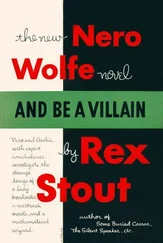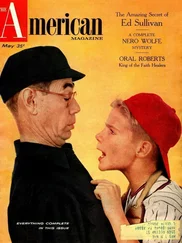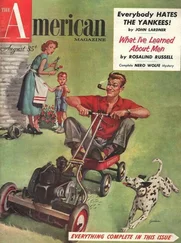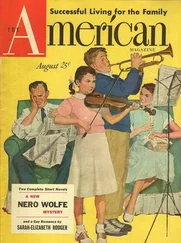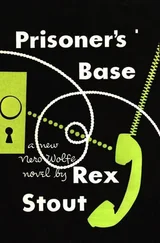Rex Stout - And Four to Go
Здесь есть возможность читать онлайн «Rex Stout - And Four to Go» весь текст электронной книги совершенно бесплатно (целиком полную версию без сокращений). В некоторых случаях можно слушать аудио, скачать через торрент в формате fb2 и присутствует краткое содержание. Жанр: Старинная литература, en-GB. Описание произведения, (предисловие) а так же отзывы посетителей доступны на портале библиотеки ЛибКат.
- Название:And Four to Go
- Автор:
- Жанр:
- Год:неизвестен
- ISBN:нет данных
- Рейтинг книги:5 / 5. Голосов: 1
-
Избранное:Добавить в избранное
- Отзывы:
-
Ваша оценка:
- 100
- 1
- 2
- 3
- 4
- 5
And Four to Go: краткое содержание, описание и аннотация
Предлагаем к чтению аннотацию, описание, краткое содержание или предисловие (зависит от того, что написал сам автор книги «And Four to Go»). Если вы не нашли необходимую информацию о книге — напишите в комментариях, мы постараемся отыскать её.
And Four to Go — читать онлайн бесплатно полную книгу (весь текст) целиком
Ниже представлен текст книги, разбитый по страницам. Система сохранения места последней прочитанной страницы, позволяет с удобством читать онлайн бесплатно книгу «And Four to Go», без необходимости каждый раз заново искать на чём Вы остановились. Поставьте закладку, и сможете в любой момент перейти на страницу, на которой закончили чтение.
Интервал:
Закладка:
Flora’s voice came from behind my shoulder. “They’re coming out, so if there’s a chair you like, grab it. Except the six up front; they’re for the speakers.”
Naturally I started to tell her I wanted the one next to hers, but didn’t get it out because people came jostling out of the tent onto the extension. Thinking I had better warn Wolfe that the chair he was about to occupy for an hour or so was about half as wide as his fanny, to give him time to fight his impulses, I worked past to the edge of the entrance, and when the exodus had thinned out I entered the tent. Five men were standing grouped beside a cot which was touching the canvas of the far side, and a man was lying on the cot. To my left Nero Wolfe was bending over to peer at the contents of a metal box there on a table with its lid open. I stepped over for a look and saw a collection of bone-handled knives, eight of them, with blades varying in length from six inches up to twelve. They weren’t shiny, but they looked sharp, worn narrow by a lot of use for a lot of years. I asked Wolfe whose throat he was going to cut.
“They are Dubois,” he said. “Real old Dubois. The best. They belong to Mr. Korby. He brought them to use in a carving contest, and he won, as he should. I would gladly steal them.” He turned. “Why don’t they let that man alone?”
I turned too, and through a gap in the group saw that the man on the cot was Philip Holt, URWA’s director of organization. “What’s the matter with him?” I asked.
“Something he ate. They think snails. Probably the wrong kind of snails. A doctor gave him something to help his bowels handle them. Why don’t they leave him alone with his bowels?”
“I’ll go ask,” I said, and moved.
As I approached the cot James Korby was speaking. “I say he should be taken to a hospital, in spite of what that doctor said. Look at his color!”
Korby, short, pudgy, and bald, looked more like a restaurant customer than a restaurant worker, which may have been one reason he was president of URWA.
“I agree,” Dick Vetter said emphatically. I had never seen Dick Vetter in person, but I had seen him often enough on his TV show-in fact, a little too often. If I quit dialing his channel he wouldn’t miss me, since twenty million Americans, mostly female, were convinced that he was the youngest and handsomest MC on the waves. Flora Korby had told me he would be there, and why. His father had been a bus boy in a Broadway restaurant for thirty years, and still was because he wouldn’t quit.
Paul Rago did not agree, and said so. “It would be a pity,” he declared. He made it “peety,” his accent having tapered off enough not to make it “peetee.” With his broad shoulders and six feet, his slick black hair going gray, and his mustache with pointed tips that was still all black, he looked more like an ambassador from below the border than a sauce chef. He was going on. “He is the most important man in the union-except, of course, the president-and he should make an appearance on the platform. Perhaps he can before we are through.”
“I hope you will pardon me.” That was H. L. Griffin, the food and wine importer. He was a skinny little runt, with a long narrow chin and something wrong with one eye, but he spoke with the authority of a man whose firm occupied a whole floor in one of the midtown hives. “I may have no right to an opinion, since I am not a member of your great organization, but you have done me the honor of inviting me to take part in your celebration of our country’s independence, and I do know of Phil Holt’s high standing and wide popularity among your members. I would merely say that I feel that Mr. Rago is right, that they will be disappointed not to see him on the platform. I hope I am not being presumptuous.”
From outside the tent, from the loudspeakers at the corners of the platform, a booming voice had been calling to the picnickers scattered over the meadow to close in and prepare to listen. As the group by the cot went on arguing, a state trooper in uniform, who had been standing politely aside, came over and joined them and took a look at Philip Holt, but offered no advice. Wolfe also approached for a look. Myself, I would have said that the place for him was a good bed with an attractive nurse smoothing his brow. I saw him shiver all over at least three times. He decided it himself, finally, by muttering at them to let him alone and turning on his side to face the canvas. Flora Korby had come in, and she put a blanket over him, and I noticed that Dick Vetter made a point of helping her. The breeze was sweeping through and one of them said he shouldn’t be in a draft, and Wolfe told me to lower the flap of the rear entrance, and I did so. The flap didn’t want to stay down, so I tied the plastic tape fastening to hold it, in a single bowknot. Then they all marched out through the front entrance to the platform, including the state trooper, and I brought up the rear. As Korby passed the table he stopped to lower the lid on the box of knives, real old Dubois.
The speeches lasted an hour and eight minutes, and the ten thousand URWA members and guests took them standing like ladies and gentlemen. You are probably hoping I will report them word for word, but I didn’t take them down and I didn’t listen hard enough to engrave them on my memory. At that, the eagle didn’t scream as much or as loud as I had expected. From my seat in the back row I could see most of the audience, and it was quite a sight.
The first speaker was a stranger, evidently the one who had been calling on them to gather around while we were in the tent, and after a few fitting remarks he introduced James Korby. While Korby was orating, Paul Rago left his seat, passed down the aisle in the center, and entered the tent. Since he had plugged for an appearance by Philip Holt I thought his purpose might be to drag him out alive or dead, but it wasn’t. In a minute he was back again, and just in time, for he had just sat down when Korby finished and Rago was introduced.
The faces out front had all been serious for Korby, but Rago’s accent through the loudspeakers had most of them grinning by the time he warmed up. When Korby left his chair and started down the aisle I suspected him of walking out on Rago because Rago had walked out on him, but maybe not, since his visit in the tent was even shorter than Rago’s had been. He came back out and returned to his chair, and listened attentively to the accent.
Next came H. L. Griffin, the importer, and the chairman had to lower the mike for him. His voice took the loudspeakers better than any of the others, and in fact he was darned good. It was only fair, I thought, to have the runt of the bunch take the cake, and I was all for the cheers from the throng that kept him on his feet a full minute after he finished. He really woke them up, and they were still yelling when he turned and went down the aisle to the tent, and it took the chairman a while to calm them down. Then, just as he started to introduce Dick Vetter, the TV star suddenly bounced up and started down the aisle with a determined look on his face, and it was easy to guess why. He thought Griffin was going to take advantage of the enthusiasm he had aroused by hauling Philip Holt out to the platform, and he was going to stop him. But he didn’t have to. He was still two steps short of the tent entrance when Griffin emerged alone. Vetter moved aside to let him pass and then disappeared into the tent. As Griffin proceeded to his chair in the front row there were some scattered cheers from the crowd, and the chairman had to quiet them again before he could go on. Then he introduced Dick Vetter, who came out of the tent and along to the mike, which had to be raised again, at just the right moment.
Читать дальшеИнтервал:
Закладка:
Похожие книги на «And Four to Go»
Представляем Вашему вниманию похожие книги на «And Four to Go» списком для выбора. Мы отобрали схожую по названию и смыслу литературу в надежде предоставить читателям больше вариантов отыскать новые, интересные, ещё непрочитанные произведения.
Обсуждение, отзывы о книге «And Four to Go» и просто собственные мнения читателей. Оставьте ваши комментарии, напишите, что Вы думаете о произведении, его смысле или главных героях. Укажите что конкретно понравилось, а что нет, и почему Вы так считаете.

